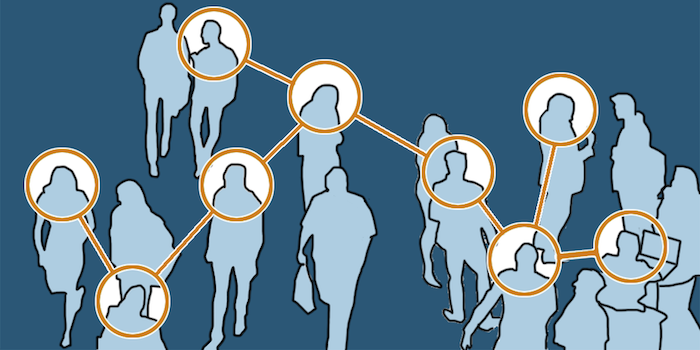Networking is an important part of any research career,1 with many experts considering networking and networking-focused training an essential part of the PhD and postdoctoral experience. Such experience is an invaluable asset to any individual, significantly enhancing their personal profile when searching for job opportunities or when it comes to establishing new working relationships.
However, what do you do if the thought of striking up a conversation with a stranger or being introduced to new peers by a mentor or colleague fills you with dread? This post will outline some ways to take advantage of networking that are useful for everyone, especially the introverts among us.

1. Preparation is Key
Preparation is key if you don’t have much time or energy for socializing. Preparation for networking comes in several forms. First is thinking about your “elevator pitch”—how you can succinctly summarize what you do and what you’re looking for. If you’re shy and nervous when speaking to others, having a few pre-prepared “canned phrases” on hand can give you a safety net to fall back on. This comes in handy, especially when you’re feeling overwhelmed and are struggling to find the right words.
The second part of preparation is thinking about what you want to get out of networking. Are you looking to establish a collaboration with someone who specializes in a specific technique that might address your scientific questions? Are you looking for your next job? Or would you like to find a mentor? Setting an intention in advance and being transparent with your goals can be a big help when it comes to deciding who to approach and what to say to them.
Third, knowing who will be attending the conference is critical if you want to target a specific individual. While you never know what serendipitous opportunities may arise, if you find social interactions draining or intimidating, being selective about who you plan to interact with prior to an event can be beneficial. Doing some background reading on each individual, such as their particular research interests and recent papers they've published, who they trained with, where they went to school, etc., may help you find a good conversation starter, potentially boosting your chances of a positive interaction and forming a lasting connection.
2. Choose the Right Conference for You
Most scientific disciplines have a variety of conference types. These might range from big meetings involving thousands of people to parallel sessions covering many different disciplines to more specialized technical meetings with only 50-500 attendees.
Bigger is not always better when it comes to networking opportunities. Large, multi-session meetings may have everyone running, desperately trying to find the next talk, with little continuity to establish and develop a connection. A smaller meeting may be more discussion-oriented and give you the chance to get to know people during the conference sessions in the framework of a panel or structured discussion—eliminating the need for an awkward introduction.
When you’re just starting out, you might find it advantageous to start with smaller conferences and gradually work up to larger events as you get more comfortable.
3. Listen Attentively
Any networking opportunity is a two-way exchange. While there may be some very altruistic people out there who are happy to support others, the most successful networking results from a mutually beneficial arrangement. Being a good listener is a key part of good networking. This skill creates a chance for the other person to share essential information, potentially facilitating the development of mutual connections, whether related to work matters or shared goals.
Even if you only make one or two connections during a meeting, if they’re meaningful and relevant to what you need and you’ve established a good mutual understanding, this can be far more valuable than getting to know everyone attending the conference.
Don’t be afraid to ask open-ended questions and take some of the pressure off yourself. Many researchers love nothing more than talking about their work; therefore, asking open questions is a good way to give them the space to share and for you to learn something new.
4. Take Breaks
Often, evening events such as cocktail hours or dinners can present a less formal opportunity for networking. However, conferences can be overwhelming for many attendees, especially introverts. With a continuous series of talks, the constant need to stay focused and ready for conversations, and the pressure to maintain a professional appearance, feeling tired is completely normal. Since many conferences last just a few days, it’s easy to put pressure on yourself to attend as many networking events as possible. However, this often isn’t sustainable, especially for introverts. If you need a break, take it. Pre-planning daily downtime can help manage this intensity. Aim to balance your breaks, ensuring you benefit from all facets of the conference, including some of the more relaxed evening socials.
As mentioned before, having good quality, focused conversations is better than forcing yourself to entertain discussions you’re not actually invested in.
5. Head Online
Not all networking has to be done in person. Since the emergence of COVID-19, there has been an increased awareness of the value of social networking for advancing scientific research2,3 with many connections now being made over social media—particularly in the science communication and dissemination community—or through online meetings. ResearchGate and LinkedIn are still the networking platforms of choice for many researchers, but there’s also value in connecting with other scientists and promoting your work on channels such as X—as well as BlueSky, Mastodon, and WeChat, to name a few. Starting a two-way dialogue by commenting on other people’s posts is a great way to increase your visibility in your research area.
Online conferences also offer more structured networking events, which can be helpful in initiating interactions, especially if you’re feeling somewhat reserved. Don’t forget to participate in panel discussions or virtual social gatherings. Any opportunity to discuss is a chance to get your name recognized by others and provides a conversation starter or a topic for follow-up once the session concludes. Many conference platforms also have direct messaging features; use them to schedule one-on-one meetings if a discussion is left unfinished or if you have another question after a positive interaction.
Zoom, Teams, and Google Meet are still popular mediums of choice for many meetings, though some prefer to use other platforms. If you’re having trouble figuring out a new platform, don’t be afraid to ask for help. You want to be able to make the most of any online opportunities as much as in-person, as so much networking is now done in both environments.
Putting It All Together
Networking, whether online or in person, doesn’t have to be a chore. Just take things at your own pace, prepare, and remember, everyone probably feels as awkward as you do!
In the world of networking, practice makes perfect. Make your preparations before the event and start small—coming away from a conference with even one new connection is a huge success. Practicing allows you to discover the networking style that suits you best, helping you build confidence. Eventually, you might even find the entire process enjoyable.
References
- Subramanian S. The Importance of Conferences and Networking in PhD and Postdoctoral Training. Curr Protoc Essent Lab Tech. 2020;21(1). doi:10.1002/cpet.44
- Crawford M. Biologists Using Social-networking Sites to Boost Collaboration. BioScience. 2011;61(9):736-736. doi:https://doi.org/10.1525/bio.2011.61.9.18
- Maxmen A. Networking in times of pandemic. Nature Computational Science. 2021;1(6):385-385. doi:https://doi.org/10.1038/s43588-021-00096-x
23-FLE-75743






